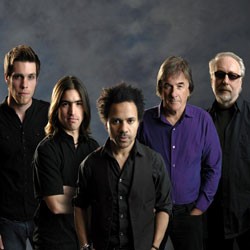
- The Yardbirds
Featuring original members Chris Dreja and Jim McCarty, innovative Brit rockers the Yardbirds are back and going strong, nearly 50 years after first hitting U.S. shores in the early 1960s. Though the band helped to launch the careers of such rock icons as Eric Clapton, Jeff Beck and Jimmy Page — all of whom spent formative years in the Yardbirds — the Rock and Roll Hall of Fame inductees have hardly been resting on their considerable laurels. They have toured throughout the 1990s and 2000s and made records — including an album of original material in 2003, Birdland.
Seven Days recently caught up with McCarty, by phone from Toronto, in advance of the band’s upcoming gig at the Tupelo Music Hall in White River Junction on Saturday, September 3.
SEVEN DAYS: The Yardbirds have been around for a long, long time. What has kept you going?
JIM MCCARTY: I suppose the main part was that we had a long break. We originally split up in 1968 and didn’t really re-form again until the mid-’90s.
SD: Why re-form, then?
JM: There was a lot of interest, a lot of demand to reappear, so to speak. I was playing in a blues band and knew some musicians that could help out. So it seemed an obvious thing to do.
SD: Was there any trepidation about getting the band back together after so long?
JM: Well, we tried it as an experiment. And it’s such a strong repertoire that we couldn’t really go wrong, in a way. I had been playing anyway and had never really given up music. I was writing. So I think we just tried it out and it worked. It just sort of came around again, so it was quite easy to carry on.
SD: Obviously, people who grew up listening to the Yardbirds are excited to see you back. But that generation of music has been very influential, particularly on a lot of music being made today by modern bands. Have you seen your crowds start to reflect that and get younger?
JM: [Chuckles.] Well, there are all the die-hard fans, of course. But there is a younger feeling to it, I must say. Sometimes you get whole families, dads bringing their children, you know?
SD: That must be a nice feeling.
JM: Sure. I think a lot of people find us through Led Zeppelin. They go back further, look into that band a bit deeper, and find us.
SD: Speaking of Zep, the Yardbirds had a pretty unbelievable trio of guitar players come through the band and get their starts. How were you able to find Clapton, Page and Beck?
JM: I think it was partly luck. And partly having to live up to a high standard that we created from square one. The music we started with, quite simple blues 12 bars, was the perfect platform for lead guitar players because they had so much space. Eric [Clapton], especially, was just starting. Though he was very good at that time, too. But he was still learning. He was enthusiastic and keen about his own playing. And, of course, eventually he thought we were selling out by recording non-blues songs as singles. So he left.
SD: Do you take pride in helping to give those guys their starts?
JM: I do, actually. I think they were all destined to do their own thing. They all found it — well, not Jimmy so much, but the other two — they found it difficult to be confined in a band. They were destined to be in a situation where they called all the shots. And that’s what happened.
SD: When the British Invasion was happening, were you aware of how important it was to the landscape of pop music?
JM: We were just playing because it was fun and people seemed to like us. We were just having a bit of a laugh. Then, as it went on, it became a very exciting time because there were lots of English bands in particular doing interesting things. But you always needed a hit single to progress. That was a challenge for us.
SD: Why was that a challenge?
JM: We saw our contemporaries having hit singles — the Animals, the Moody Blues, the Rolling Stones. And it was difficult for us because our sound was more exciting live than in the studio. It sounded very tame, and we never really got a good sound in British studios. But eventually we got the right songs and the right studios in America.
SD: Are you fans of any of the bands that came after you and were clearly influenced by what you and other British Invasion bands were doing?
JM: Well, people usually did it better! [Laughing.] The McCoys had a big hit with “Hang On Sloopy,” and it was a better version. Our version was never quite right. I always thought Aerosmith were a very good band. They joined the two generations, really. From the ’60s to almost up to date. They were all very good players. And, of course, Zeppelin, they were all slightly better than we were, technically, and did it heavier than we did. They were pretty good.
SD: Yup.









Comments
Comments are closed.
From 2014-2020, Seven Days allowed readers to comment on all stories posted on our website. While we've appreciated the suggestions and insights, right now Seven Days is prioritizing our core mission — producing high-quality, responsible local journalism — over moderating online debates between readers.
To criticize, correct or praise our reporting, please send us a letter to the editor or send us a tip. We’ll check it out and report the results.
Online comments may return when we have better tech tools for managing them. Thanks for reading.